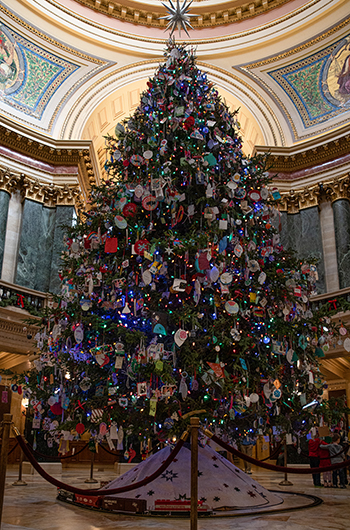What’s in a name?
When a secular holiday is a national holday, public entities should be inclusive
December 12, 2019

The holiday tree in the Wisconsin State Capitol building has become the subject of debate.
Governor Tony Evers made a stir unveiling the theme for this year’s State Capitol holiday tree: “Celebrate Science.”
The controversy wasn’t the theme for the tree, but what he called the tree: holiday tree.
Originally coined a Christmas tree when first displayed in 1916 in the capitol rotunda, the tree went under the radar until 1985, when officials decided to refer to it as a holiday tree to avoid the perception that they were endorsing any specific religion.
When Gov. Scott Walker took office in 2011, he reverted to calling it a Christmas tree again. Now Evers has reverted again to the 1985 decision.
Personally, I am not offended by either name. Evergreen trees are traditionally decorated for Christmas, and Christmas, as I have known it my whole life, has been centered around shopping, gifts, Santa, and decorating a tree. Religious symbolism of Christmas still remains in Christian houses of worship such as nativity scenes and in homes where Christianity is observed. But I also respect the idea of making the tree less about a specific religion and more about inclusivity.
I do not see this move toward inclusivity as an attack on one group of people. Many are angered about state entities trying to avoid religious symbolism with the renaming of the holiday tree. I’m sure we have all heard about the “attack on Christmas” people claim is happening.
The way I see it, using a term like holiday is inclusive. I’ve spent many a holiday season uttering a cheerful “happy holidays” to people while working in various retail jobs, only to have them pointedly say “merry Christmas” back to me.
Whatever your religion, it is fine with me. I take any message of good cheer from any religion as a gesture of good will.
Working in retail, many of us are urged not to use religion in our greetings to avoid making anyone feel like they aren’t included.
The other side of this is we all know it’s a Christmas tree. But even the Christmas tree has its origins in other religions. Paganism was widespread among much of Europe and the Roman Empire when Christianity was first introduced.
The tradition of Christmas overlays with the celebration of winter solstice, and in the Roman Empire, Saturnalia. These traditions had families decorating their homes with greenery in the dark winter months. Is calling it a holiday tree really so far off?
Even the birth of Jesus was supposedly not in the month of December, but is celebrated during this time as part of previously existing religious celebrations.
The most important thing is to enjoy the holiday season with family and friends and celebrate in whatever way you see fit. While the holiday tree may seem like it is pushing out Christianity, in reality the name is meant to include everybody.






























